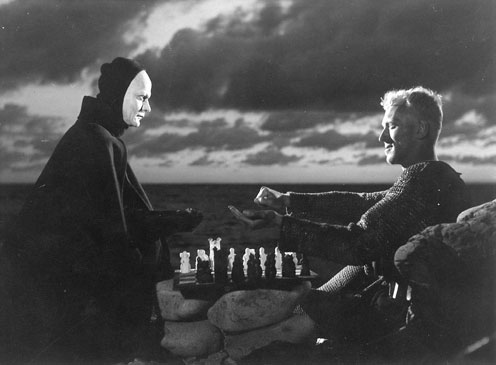This evening I told my six-year-old-twins the bad news: we have to put down our aging tortoiseshell cat Scully. Part of what made the task emotionally difficult was not just that they love the cat but that they live in a culture where they are shielded from death. If they’d been living in the nineteenth century they probably would have already seen a dead body, maybe laid out in someone’s home or at a neighbourhood funeral. But not today, where our contact with death, and conversations about it, are remarkably limited. Death is a subject as taboo as sex was during the Victorian era, even though issues such as euthanasia and palliative care are creating an element of public discussion. Continue reading
Category: belief
How old men living in cages in Hong Kong opened my mind
 I’ve been giving a lot of talks in the last few weeks about my new book Empathy: A Handbook for Revolution. And almost every time someone asks me about the personal experiences that led to my own interest in empathy. So here I’d like to share one of these experiences – a kind of epiphany – from my time growing up as a teenager in Hong Kong. Continue reading
I’ve been giving a lot of talks in the last few weeks about my new book Empathy: A Handbook for Revolution. And almost every time someone asks me about the personal experiences that led to my own interest in empathy. So here I’d like to share one of these experiences – a kind of epiphany – from my time growing up as a teenager in Hong Kong. Continue reading
How to master simple living in 2014
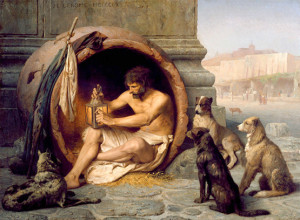 Okay, the Christmas frenzy is over and it’s time for resolutions. What’s it going to be in 2014? For the coming year I’m going to borrow a mantra from the 19th century naturalist Henry David Thoreau, who preached the pleasures and virtues of ‘simplicity, simplicity, simplicity’.
Okay, the Christmas frenzy is over and it’s time for resolutions. What’s it going to be in 2014? For the coming year I’m going to borrow a mantra from the 19th century naturalist Henry David Thoreau, who preached the pleasures and virtues of ‘simplicity, simplicity, simplicity’.
And for a bit more inspiration, I’ve written an article on what we can learn today from the great simple livers from history (including Thoreau). Check it out over at YES! Magazine.
Six Life Lessons from Leo Tolstoy
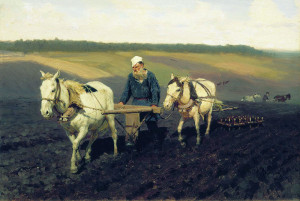 Tolstoy was more than just a great novelist with one of the best beards of the nineteenth century. He was also a radical social and political thinker who was constantly grappling with the problem of how to live. I’ve just written an article about his approach to the art of living called Six Life Lessons from Leo Tolstoy, which you can find over at Powells Books Blog.
Tolstoy was more than just a great novelist with one of the best beards of the nineteenth century. He was also a radical social and political thinker who was constantly grappling with the problem of how to live. I’ve just written an article about his approach to the art of living called Six Life Lessons from Leo Tolstoy, which you can find over at Powells Books Blog.
The article is based on my new book How Should We Live? Great Ideas from the Past for Everyday Life, published in the US this week. (In the UK this same book was published under the title The Wonderbox – apologies for any confusion!)
How Should We Live? Great Ideas from the Past for Everyday Life
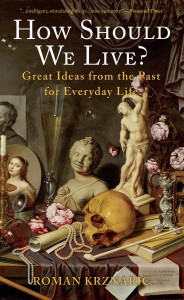 It’s launch day for my new book How Should We Live? Great Ideas from the Past for Everyday Life, which has just been released in the US. Previously published in the UK under the title The Wonderbox (sorry, a bit confusing, I know), it’s about what history can teach us about the art of living. What might we learn from the Ancient Greeks about the different varieties of love, from the Renaissance about creativity and death, or from the industrial revolution about rethinking our attitudes to work, money and family life?
It’s launch day for my new book How Should We Live? Great Ideas from the Past for Everyday Life, which has just been released in the US. Previously published in the UK under the title The Wonderbox (sorry, a bit confusing, I know), it’s about what history can teach us about the art of living. What might we learn from the Ancient Greeks about the different varieties of love, from the Renaissance about creativity and death, or from the industrial revolution about rethinking our attitudes to work, money and family life?
But rather than tell you all about the book myself, there’s a fascinating review and discussion of it by the brilliant Maria Popova from Brain Pickings, which came out today. She describes it (most flatteringly) as ‘an illuminating and awakening read in its entirety’. Check out her full article, which focuses on the topics of love, time and empathy.
Four Ways to Rethink ‘Having It All’ (Without Leaning In)
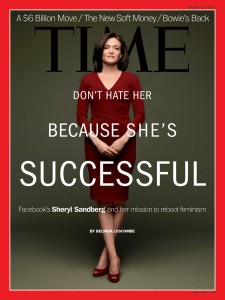 Here’s an article I just wrote for the Wall Street Journal on the dilemmas of balancing work and family life. Is Facebook COO Sheryl Sandberg, author of Leaning In, right to think that women can ‘have it all’ if only they really believe in themselves? My approach is not to answer the question ‘Is it possible to have it all?’ but to put it under the microscope and rethink it. (And this is an issue for men too…)
Here’s an article I just wrote for the Wall Street Journal on the dilemmas of balancing work and family life. Is Facebook COO Sheryl Sandberg, author of Leaning In, right to think that women can ‘have it all’ if only they really believe in themselves? My approach is not to answer the question ‘Is it possible to have it all?’ but to put it under the microscope and rethink it. (And this is an issue for men too…)
The Human Zoo: The tyranny of group-don’t-think
 There’s a fascinating new BBC Radio 4 series called The Human Zoo, looking at the ins and outs of who we really are – are we led by the head or the heart? what are the quirks and qualities that drive human behaviour? Episode 4 focuses on why human beings find it so difficult to admit when they are wrong, especially when they are part of groups. I’ve contributed some thoughts to the programme on The Tyranny of Group-Don’t-Think, which you’ll find in written form below… Continue reading
There’s a fascinating new BBC Radio 4 series called The Human Zoo, looking at the ins and outs of who we really are – are we led by the head or the heart? what are the quirks and qualities that drive human behaviour? Episode 4 focuses on why human beings find it so difficult to admit when they are wrong, especially when they are part of groups. I’ve contributed some thoughts to the programme on The Tyranny of Group-Don’t-Think, which you’ll find in written form below… Continue reading
How Goethe can change your life – 3 lessons for 2013

So you’ve drawn up your list of New Year’s resolutions. Some are probably achievable, like giving up eating chocolate for breakfast. Others may be more daunting because they represent a long-held desire to take your life in a new direction, anything from changing career to renewing family relationships. If you’ve resolved to make a big change, I suggest having a companion by your side who’ll give you encouragement and inspiration. An ideal choice is the eighteenth-century German writer and natural scientist Johann Wolfgang von Goethe. In his book Italian Journey, Goethe describes an episode from his own life that offers three essential lessons for making 2013 a year of New Year’s adventuring. Continue reading
Can reading a novel change the world?
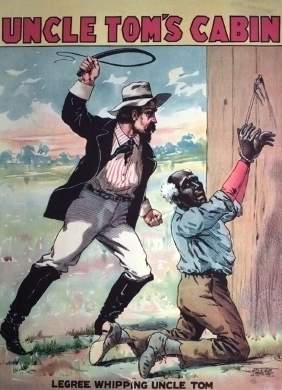 ‘It was through books that I first realised there were other worlds beyond my own; first imagined what it might be like to be another person,’ wrote novelist Julian Barnes in a recent Guardian essay. It’s an enticing thought that reading fiction might help us escape the straitjacket of our egos and expand our moral universes. Modern literary theorists are, however, decidedly sniffy about the notion. ‘They see the idea as too middlebrow, too therapeutic, too kitsch, too sentimental, too Oprah,’ according to Steven Pinker in his latest tome, The Better Angels of Our Nature.
‘It was through books that I first realised there were other worlds beyond my own; first imagined what it might be like to be another person,’ wrote novelist Julian Barnes in a recent Guardian essay. It’s an enticing thought that reading fiction might help us escape the straitjacket of our egos and expand our moral universes. Modern literary theorists are, however, decidedly sniffy about the notion. ‘They see the idea as too middlebrow, too therapeutic, too kitsch, too sentimental, too Oprah,’ according to Steven Pinker in his latest tome, The Better Angels of Our Nature.
Yet Pinker, together with philosopher Martha Nussbaum, psychologist Keith Oatley and historian Lynn Hunt, is amongst a new band of champions for the idea that reading can indeed change not just ourselves, but the world. If we want to put this idea to the test, a good starting point is one of the most popular novels of the nineteenth century, Harriet Beecher Stowe’s Uncle Tom’s Cabin. What interests me, though, is not simply the extraordinary social impact of this admittedly sentimental story, but what its writing reveals about the origins of morality itself. Continue reading
Jubilee’ve the hype? One hundred years of royal PR
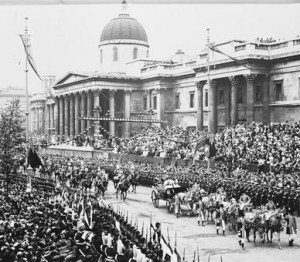
Over a million rain-soaked loyal subjects watched the Queen’s barge and a thousand support vessels bobble along the Thames this weekend to celebrate the Diamond Jubilee. And around the country many more millions joined the festivities at street parties, country fairs, community dances and cake sales.
But now the Union Jacks have been put away, we can sit back calmly and consider the big question raised by this extraordinary spectacle: How is it possible, in a modern democratic age, that 80% of British people (I’m Australian, by the way) still support the institution of monarchy – an unelected, hereditary head of state? Continue reading
